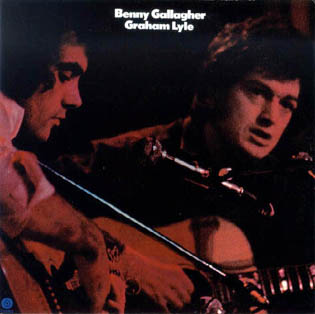 1967 Gib Gilbeau & Gene Parsons - Louisiana Rain
1967 Gib Gilbeau & Gene Parsons - Louisiana Rain Gib Guilbeau
Gib Guilbeau and
Gene Parsons released a couple of singles in 1967-1968, and also recorded an album of material at the time that almost got released in 1968. It didn't appear in the late '60s, though, and eventually a slightly altered version of the original album came out, credited to
Gib Guilbeau and titled
Cajun Country, in the early '70s. This 25-track disc, has the album, the singles, a half-dozen previously unreleased
Guilbeau &
Parsons demos and outtakes and a 1969
Gib Guilbeau solo single. It's for a specialized collector market, for sure. But anyone seriously interested in the genesis of
country/rock should hear this, both for its historic importance and for the quality of the music.
Gib Guilbeau and
Gene Parsons, as well as other musicians heard here like
Clarence White and
Wayne Moore (who played with Gillbeau and Parsons in
Nashville West), were forging some
country-rock directions on these recordings that anticipated the late-'60s work of the
Byrds and the
Flying Burrito Brothers. Later
Gene Parsons and Clarence White were members of the
Byrds,
Gib Guilbeau was a member of the later
Flying Burrito Brothers.
 1968 The Reasons (aka Nashville West) - Nashville West
1968 The Reasons (aka Nashville West) - Nashville West
Gene Parsons and
Gib Guilbeau were hired for a recording session with the
Gosdin Brothers' singing duo of
Vern and
Rex Gosdin. The session, being produced by
Byrd Chris Hillman, included guitarist
Clarence White, who had formerly played with the
Kentucky Colonels.
Parsons,
Guilbeau and
White then went on to play on sessions together. They became a band, joining with fellow session player, bassist-vocalist
Wayne Moore, who played in the
Castaways with
Parsons and
Guilbeau. The group was known by various names, including
The Reasons,
Gib Guilbeau and The Reasons, the
Gary Paxton Band or
Cajun Gib and Gene.
Gene Parsons and
Clarence White quit to be
Byrds. The
Nashville West moniker was taken from the name of the El Monte, California club where they sat as the house band. The album was reissued on CD by Sierra in 1997, and added four more tracks not included on the LP edition.
 1970 Swampwater - SwampwaterSwampwater
1970 Swampwater - SwampwaterSwampwater formed and started out as
Linda Ronstadt’s backing group in 1969. In that time they featured Linda's first three solo albums.
Eric White, Clarence’s brother was also in the band and prior to forming
Swampwater had been in the excellent
Kentucky Colonels. Swampwater made two distinct albums in the early 70’s. This album was different than many notable country rock acts of the time for adding cajun and swamprock elements. The album opens and closes with two certified country-rock classics,
Louisiana Woman and
Big Bayou.
Guilbeau had recorded the classy
Louisiana Woman with both
Nashville West and on his 1970 album with
Parsons, though the version heard on Swampwater is the best.
Big Bayou is a hard rocking, white hot country song with pretty fiddle that has been covered by many popular artists including
Rod Stewart. Other songs like the acoustic flavored
Man From New Orleans are highlighted by beautiful harmonies and a tear in your beer ambience. Swampwater’s musicianship is high caliber and Guilbeau’s lyrics are always first-rate and thoughtful. Great songs like
Kathleen,
Desperation’s Back Again (an Everly Brothers homage) and
River People are beautifully arranged and display superior craftsmanship. It’s really a wall of greatness, with each song just as good as the next. Swampwater mastered all the rural styles from cajun to folk-rock but just never received the breaks they so justly deserved. Their members were slugging it out in bars playing this sort of music years before anyone else had thought to do so. This album is a masterpiece and recommended to any true country fan.
 1971 Swampwater - Swampwater
1971 Swampwater - SwampwaterFirst, the album title is no error. These guys have two different albums with the same title!?
Their second album and another really good country-rock outing. This self-titled effort was released off RCA in 1971 and came packaged in a strange jacket.
Swampwater’s lineup had remained the same since their debut
.In comparison to that debut, there were a few more rock n roll tracks like the album opener
Ooh-Wee California, the raw
Dakota, and Ol’Papa Joe. These songs were good though, with well constructed guitar solos and strong bluegrass and cajun flavors. There were a few covers too but all were standouts like the excellent heartfelt version of
One Note Man, a track with nice jangly Byrdish guitar solos and pretty fiddle, which gave the song real atmosphere.
Guilbeau also resurrected
Gentle Ways of Lovin’ Me, a track he had recorded on numerous occasions with many different bands. Swampwater turned in one of the best versions of this song which is highlighted by barrelhouse banjo and a delicate, sincere arrangement. Another great track,
Headed For The Country, compared favorably with the country-rock era Byrds, and had beautiful, sad folk-like harmonies and fine guitar playing. All in all the album was strong, lacking any weak moments and showcased a great band that should have been at least as well known as Poco or Firefall.

 1981 Hermann Rarebell - Nip In The Bud
1981 Hermann Rarebell - Nip In The Bud
 1983 Klaus Peter Matziol - Matze
1983 Klaus Peter Matziol - Matze
 1983 Klaus Hess - Sternentanz
1983 Klaus Hess - Sternentanz
 1987 Manfred Wieczorke - Transfer
1987 Manfred Wieczorke - Transfer






























 The Au Go-Go Singers included
The Au Go-Go Singers included 














.jpg)
%20@320.jpg)

